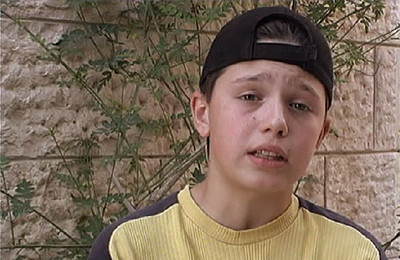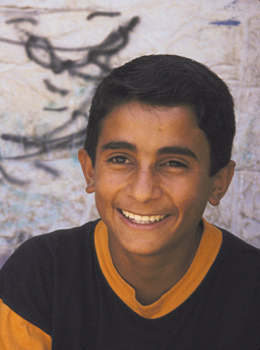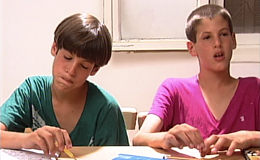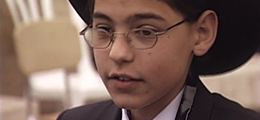"If we are to teach real peace in this world, and if we are to carry on a real war against war, we shall have to begin with the children."
Mahatma Gandhi
The quote above summarizes B.Z Goldberg's efforts in the 2001 documentary "Promises", in which the lives of seven children living in or around Jerusalem are portrayed in the course of three years. But what started as a project to depict the lives of Israeli and Palestinian children ended as a critique to the development of the conflict, and more importantly, to the lack of communication between both sides. The Israeli-Palestinian conflict has been present since the formation of the state of Israel, in 1948, but has recently been intensified. One of the documentary's strongest scenes shows the crew in front of a prison and the guards need someone who speaks both Hebrew and Arabic. Shockingly, there is nobody who can speak both languages, despite living on the same city. By exhibiting the children's daily lives, markedly influenced by the conflict, and ultimately bringing some of them together, B.Z proved that communication is the first step to achieve peace between the Jewish and Arab communities.
The documentary features seven children: four Jewish, three Muslim. Each child represents a particular faction within their own religious groups. The Jewish representatives are Moishe, who lives in a Jewish settlement in Palestinian territory, Shlomo, an orthodox Jew living in West Jerusalem, and the secular twins, Yarko and Daniel, who also live in the Holy City.
The Muslims are Mahmoud, whose dad owns a coffee shop in Jerusalem, Faraj, who lives in a refugee camp, and the only girl, Sanabel, who also lives in the camp, and whose father is in jail for being a Palestinian rights activist. The interesting thing about all these children, as B.Z points out in the beginning of the film, is that all live within twenty minutes of each other, but because of their different ethnic background, are not likely to ever meet.
The movie starts with the twins, Yarko and Daniel, who despite being secular Jews, suffer the consequences of extremist Muslim groups and the terrorist attacks. They claim to be afraid of taking the bus because of the frequent bombings. Along with the crew, they go to the Wailing Wall, and after seeing the rituals performed by extremist Jews, they respond that they "would rather visit an Arab village than be here." And they do: halfway through the documentary, the twins express the desire of meeting Arab children, and an encounter between the twins and Muslims Faraj and Sanabel is arranged.
Moishe, on the other hand, feels very strongly about his Jewish heritage, reading parts of the Quran on camera. He defends that the land belongs to the Jews, as God promised to Abraham and his children. He, along with Shlomo, are the two Jews who don't meet with the Arab children.

Mahmoud's father owns a coffee shop in Jerusalem, which means he is relatively wealthier than the other children. He believes that the land belongs to the Muslims, saying that it was Mohammed's holy place. He expresses disbelief when B.Z reveals his Jewish heritage, and defends his fondness of him by saying he is "an American Jew" and therefore not a "bad Jew". In spite of his firm beliefs, he is very similar to the other children, sneaking around, doing what he was not supposed to, and hiding his mischiefs from his parents. He doesn't want to meet Jewish children, and by the end of the movie, his views are still intact.
Shlomo, whose father is a American, is studying to be a rabbi. He lives in Jerusalem, and claims not to have any direct problems with the Arabs, and puts his faith in God instead. Because of his studies, he is exempt of enlisting in the army, unlike Yarko, Daniel and Moishe, who will be forced to serve the Israeli army for three years.

In the Deheishe refugee camp we meet Faraj and Sanabel. The boy participated on the first Intifada, and saw his friend get shot and killed by a Jewish soldier. He doesn't see a problem with violence, as long as it is against Jews, and claims the land is his. He shows an old key that opened his house in an Arab village prior to the "Jewish invasion" and is taken with
his grandmother by the crew to the location of the old village, that has been destroyed by the Israeli army. When asked if he would like to meet any Jewish children, Faraj strongly oposes, but after some persuasion, is convinced to talk to Yarko and Daniel over the phone. Faraj and the twins bond over their love for sports. Faraj then agrees to meet with Yarko and Daniel, and by the end of the movie, is the child who has been affected the most, and whose view change from complete ignorance, to acceptance and even friendship.
Sanabel is a girl whose father was imprisoned and held in a maximum security prison without a trial. When asked about her father, the girl gets emotional and is unable to answer. She is a part of a group that tells the story of the Palestinian people through traditional dances. She agrees to meet Yarko and Daniel, later on the movie, and becomes friends with them.
The encounter between the Jewish and Arab children, supervised by the crew, went astonishingly well. Any little discomfort and embarrassment that might have occurred at first was soon overcome by the many similarities between the children, such as food, games and sports. After the day, when asked about how they felt, all of the children expressed the wish to have more contact with one another, showing that communication conquered every obstacle that stood in their way. Even Faraj, who was initially reluctant to meet Yarko and Daniel, cried when asked about the conflict, saying that it was fair that the conflict between them existed.
For a detailed, in-depth analysis of the documentary, this link is excellent.
Whereas the other three children, Moishe, Shlomo and Mahmoud, when asked about it by the end of the movie, still held the same views as in the beginning, showing that the communication between the others had come to their benefit, and they gained a broader understanding, not only of the issue, but of
their lives.
To learn more about the children, this is a very helpful link
their lives.
The children are a perfect example of how an innocent, open-minded approach to a problem, in combination with communication, can change things for the better and overcome problems that otherwise may seem too big to overthrow. "Promises" has shown a little spark of hope to the future in the Middle East, and if it is not the final step to peace, it is the first of many.
To watch the full documentary, click here




